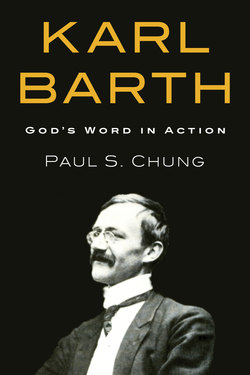Читать книгу Karl Barth - Paul S. Chung - Страница 5
На сайте Литреса книга снята с продажи.
Foreword
ОглавлениеThe famous words of old Barth, “God for the world, God for humanity, heaven for the earth,” can stand as a motto regarding this very clearly written and engaging book that marks and characterizes the life and theology of Karl Barth. Barth is without comparison as a twentieth-century theologian who has determined a field of theological discussion still present to date. In a knowledgeable and precise analysis, Paul S. Chung proposes the themes in which Barth’s theology has emerged, gained its profile, and initiated landmark decisions. In this analysis, Chung states that the churches need to have their orientation for Barth’s theology, not only in a national socialist Germany, but also in South Africa or Latin America in their most difficult crises. What is penetrated here in this book stretches from Barth’s confrontation with religious socialism (Ragaz) to his subsequent breakthrough of dialectical theology (“Tambach lecture”) and to two different editions of Romans via the first exciting encounter with Roman Catholicism (Przywara) to the century problem of natural theology (Brunner), and finally to the distinctive themes of Church Dogmatics (Christology, the church and Israel) and to openness toward ecumenicity in the face of religious pluralism. At this juncture, the difficult dogmatic problems are understandably discussed with great caution and care whether it is a debate over analogia entis, the role of extra Calvinisticum or the secret of the person of Christ (anhypostasis and enhypostasis).
What is most significant for me is that Chung is involved both knowledgeably and with daring evaluation and judgment in present-day scholarly discussions and debates about Karl Barth. Here, different interpretations such as those of Friedrich-Wilhelm Marquardt and Bruce McCormack, as well as the reservations of feminist theologians, are provocatively explicated. Furthermore, his study includes the controversially discussed relationship between Barth and Bonhoeffer and the pigeonholing charge of neo-orthodoxy. Chung’s arguments are not only of a historical or dogmatic-confessional nature. They include also the questions and problems of our present time. This makes Chung’s project a modern book and a great contribution that explicates the fascination and strength of Karl Barth, above all, articulating his intellectual achievement and profound humanity for our present-day reality in a new and fresh way.
Christian Link
University of Bochum, Germany
